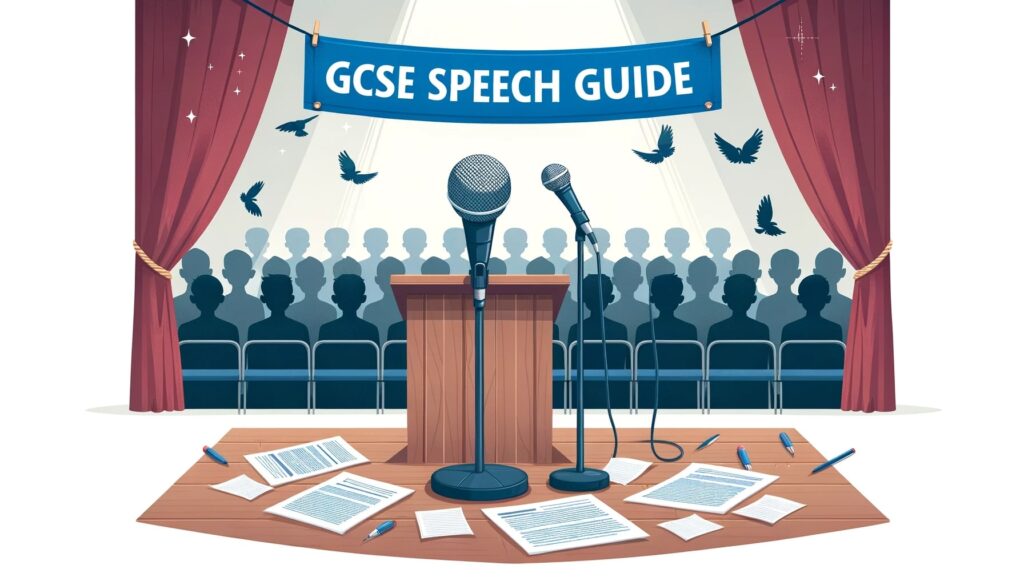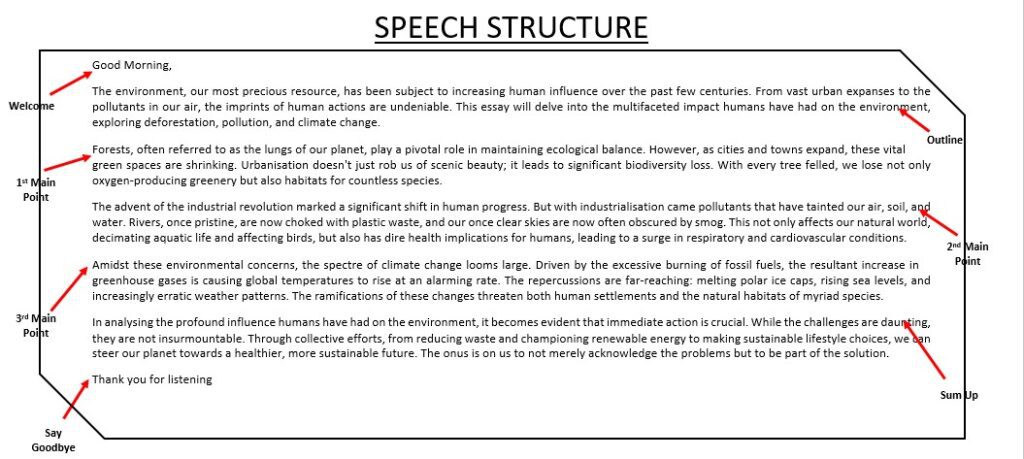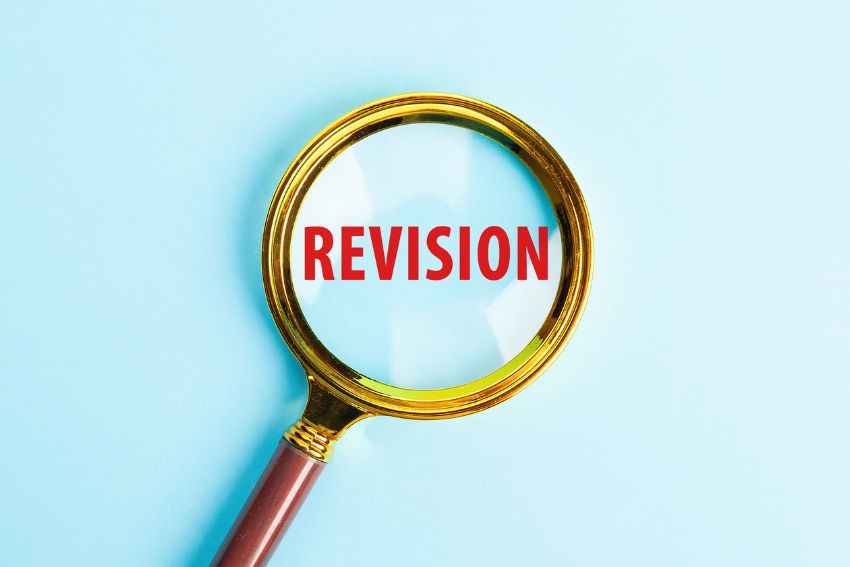How to Write a Speech GCSE – Score 9 in English GCSE Exam
Ever pondered ‘How do I start my GCSE English speech?’ or ‘What should I write my GCSE speech on?’ Crafting a compelling speech can be challenging, especially when it’s for your GCSE English exam. This guide will help you navigate the nuances of the GCSE English speaking and listening exam techniques.
What is the GCSE Speech Exam?
The Speech GCSE includes an assessment of students’ spoken language abilities. This assessment is an integral part of the English GCSE exam, where you are required to demonstrate your speaking and listening skills. Most students typically choose from a range of GCSE spoken language topic ideas and present a speech, followed by a discussion with the examiner. This assessment not only evaluates your knowledge of the topic but also the ability to structure your thoughts, use persuasive techniques, and engage the audience.

What’s the Good Starting Point for GCSE Speech?
While there is no one-size-fits-all approach to structuring your speech, understanding the basic speech layout can provide a solid starting point. Typically, you’ll want to start with an engaging introduction, followed by 2-3 key points that support your topic, and a compelling conclusion to wrap things up.

How to Choose the Right Topic For GCSE Speech?
Wondering what to include in a speec? Before you even begin writing, it’s crucial to have a well-defined topic. Your topic sets the tone for your entire speech, so it has to be something you are passionate about and can speak on with authority. Moreover, a well-chosen topic significantly impacts what makes a good speech.
While your GCSE English speaking topic should ideally be interesting to your audience, it should also resonate with your own interests and strengths. This is the time to brainstorm English GCSE speaking ideas. The right topic can not only engage your audience but also allow you to showcase your oratory skills effectively.
Knowing Your Audience
If there’s one factor that can make or break your speech, it’s the audience. Knowing who you’re speaking to allows you to tailor your language, tone, and content to resonate with them effectively. Ask yourself the following questions:
🧐 What does my audience care about?
🧐 What are their expectations?
The better you understand these aspects, the easier it will be to connect and make a meaningful impact, thus further defining what makes a good speech.
Ideas for Speaking and Listening GCSE English
Choosing a topic that resonates with your audience is key. Given the requirements for GCSE speaking exam topics, you may want to consider issues like climate change, social media’s impact on mental health, or the importance of voting. These subjects are not only engaging but also provide ample scope for discussion and argument.
Here are some English Speaking Exam Topic Ideas to Consider:
- Climate Change and Its Global Impact
- Social Media and Mental Health
- The Importance of Voting
- Artificial Intelligence and Ethics
- The Future of Work in a Post-Pandemic World
- The Role of Education in Shaping Character
- Sustainable Living and Consumer Choices
To sum up, here are some tips to consider:
Choose a topic that excites you; your enthusiasm will be contagious.
Make sure the topic is relevant to your audience.
Opt for subjects that are neither too broad nor too narrow.

The Structure of a Good GCSE Speech
A successful speech is more than just a string of words; it’s a well-thought-out sequence designed to captivate your audience. Here, we’ll delve into the speech structure and discuss how to structure a speech for maximum impact. A typical speech will consist of an introduction, body, and conclusion.
Introduction: Capture attention and state your main point.
Body: Build your argument or narrative with supporting evidence.
Conclusion: Summarise the key points and finish with a strong statement or call to action.
How do I start my GCSE English speech?
You have but a few precious moments to seize your audience’s attention. The way you start a speech can dictate whether your audience tunes in or zones out. The opening sets the tone and context for everything that follows, making it an integral part of how to open a speech effectively.
Dos and Don’ts of Starting Your GCSE Speech
✅ Dos
- Open with a Provocative Question: Pose a question that challenges common beliefs or perceptions. For instance, “What if I told you that everything you knew about climate change was wrong?”
- Share a Personal Story: Relate an anecdote or personal experience that ties into your main topic. “Three years ago, I stood at the edge of a shrinking glacier, and that moment changed my perspective forever.”
- Use a Relevant Quote: Start with a powerful quote from a renowned figure that encapsulates the essence of your speech. “As Martin Luther King Jr. once said, ‘Our lives begin to end the day we become silent about things that matter.'”
- Present a Shocking Statistic: Share a surprising fact or figure that grabs attention immediately. “Did you know that every minute, the equivalent of one garbage truck of plastic is dumped into our oceans?”
- Paint a Vivid Picture: Use descriptive language to create a vivid scene or imagery in the minds of your audience. “Imagine a world where forests no longer exist, where silence replaces the chirping of birds.”
❌ Don’ts
- With an Apology: Avoid starting with phrases like “Sorry for…” or “I’m not an expert, but…”. It undermines your credibility from the get-go.
- Using Clichés: Starting with overused phrases like “Webster’s dictionary defines…” can come off as uninspired.
- Being Too Broad or Vague: Avoid generic openings like “Today, I want to talk about life.” It doesn’t give the audience a clear sense of direction.
- Overloading with Information: Avoid bombarding your audience with too many stats or facts right at the start. It can be overwhelming.
- Being Negative or Confrontational: Starting with a confrontational tone, such as “Most of you probably won’t agree with me…” can put the audience on the defensive.

Aran A.
Maths | English Tutor
Student at UNIVERSITY OF CAMBRIDGE
£20 Per session
Book Free TrialTypes of Speech Starters
So, what makes an opening memorable? There are numerous speech starters that can serve as a strong foundation for your talk. Here are a few tried and true methods:
Start with a provocative question to engage your audience’s curiosity.
Use a relevant quote that encapsulates your message.
Kick off with a shocking fact or statistic that supports your argument.
for instance
- Start with a Provocative Question: Engage your audience’s curiosity right from the outset. For instance, “What if I told you that by 2050, there could be more plastic in the ocean than fish?”
- Use a Relevant Quote: Begin with a powerful quotation that encapsulates the essence of your message. Consider using, “Nelson Mandela once said, ‘Education is the most powerful weapon which you can use to change the world.'”
- Kick off with a Shocking Fact or Statistic: Share a surprising piece of information that supports your argument and grabs immediate attention. For example, “Recent studies reveal that an alarming 70% of young adults experience social media-induced anxiety.

Tailoring the Opening to GCSE Criteria
For students particularly interested in GCSE speaking exam topics, it’s crucial to note that examiners look for a range of specific elements in your opening. These can include clarity of expression, engagement with the audience, and a clear outline of what the speech will cover.
How to Structure My GCSE Speech?
A well-structured speech isn’t just a nicety, it’s a necessity. Especially when it comes to GCSE English, having a well-organised flow of ideas is pivotal to engaging your audience and making your points hit home. The way you structure your speech impacts not just its effectiveness but also how smoothly you can deliver it. When we talk about structure in the English language, we’re referring to the arrangement of your introduction, body, and conclusion, as well as the logical progression of your arguments.
How to make a good speech structure?
Creating a well-structured speech involves careful planning and consideration of both content and audience. Here are key steps to ensure your speech is effectively structured:
- Start with a Strong Opening:
- Capture Attention: Begin with something that grabs the audience’s attention immediately, such as a startling fact, a quote, a question, or a brief story.
- Introduce Your Topic: Clearly state what your speech is about and why it matters to your audience.
- Outline the Main Points:
- Structure Logically: Arrange your points in a logical order. This could be chronological, problem-solution, cause-effect, or order of importance.
- Transition Smoothly: Ensure each point flows into the next with smooth transitions. This helps keep the audience engaged and following your argument without confusion.
- Develop Each Point:
- Support with Evidence: For each main point, provide examples, statistics, anecdotes, or quotes from credible sources. This builds trust and credibility with your audience.
- Explain Significance: Make sure to explain why each point is relevant to the overall topic and to the audience’s interests or needs.
- Include a Strong Conclusion:
- Summarise Key Points: Briefly recap the main points of your speech to reinforce them in the audience’s mind.
- End with a Call to Action: Conclude with a strong statement that encourages the audience to act, think differently, or feel inspired. This is your chance to leave a lasting impression.
- Practice Delivery:
- Rehearse Out Loud: Practice delivering your speech multiple times to get comfortable with the flow and timing.
- Consider Timing: Make sure your speech fits within any time limits and adjust as necessary.
- Refine Body Language: Non-verbal cues, such as eye contact, gestures, and posture, are crucial in conveying your message effectively.
By following these steps, you’ll be able to construct a speech that not only delivers your message clearly and persuasively but also keeps your audience engaged throughout.
Common Structural Techniques in GCSE English
There are several structural techniques in GCSE English that can amplify your speech’s effectiveness. For example:
- Repetition:Reinforcing key points by repeating them helps to keep your audience engaged.
- Tripling: Enumerating three related points or arguments can make your speech more memorable.
- Rhetorical questions: These engage the audience and provoke thought, without requiring an answer.
- These are some of the tried-and-true structural techniques GCSE students can employ to enhance their presentations.
How Structure and Language Interact?
The marriage between structure of a speech and language is a match made in rhetorical heaven. Your language choices should serve your structural design and vice versa. For example, if you’re using tripling, you’ll need to select words or phrases that have a similar tone or rhythm to create a sense of unity. By having your English language structure techniques complement your chosen words, you’re setting the stage for a cohesive and engaging presentation.
Implementing Structural Techniques for GCSE Criteria
How do these techniques match up with GCSE criteria? To excel in GCSE English, you’ll need to demonstrate an adept use of a range of structural devices. Whether it’s crafting a compelling introduction or providing a powerful conclusion, these structural elements are integral in showcasing your understanding of the English language structure techniques required for this level of examination.
Why Language Matters in GCSE English?
You’ve probably heard the phrase, ‘It’s not what you say; it’s how you say it.’ Well, when it comes to your GCSE English speech, both matter immensely. Your choice of words and how you string them together can captivate your audience and leave a lasting impression. Employing the right GCSE English language techniques is paramount in this regard.
The Essentials of Rhetorical Devices
Rhetorical devices are the tools of the trade when it comes to effective speech writing. These include metaphors, similes, and alliteration, among others. Familiarising yourself with these techniques in the English language will enable you to elevate the quality of your speech. By doing so, you’re more likely to meet and perhaps even exceed GCSE language techniques expectations.
Crafting Sentences for Maximum Impact
The structure of your sentences can significantly influence the power of your speech. Consider varying sentence length to maintain interest, employing short, impactful sentences for key points and longer, more complex ones for detailed explanations. These are among the essential English language techniques for GCSE that you’ll want to master.
Practical Examples of Effective Structure
To solidify your understanding, consider these real-world examples:
Martin Luther King Jr.’s ‘I Have a Dream’ speech is an excellent study in effective repetition and emotive language.
Winston Churchill’s ‘We Shall Fight on the Beaches’ uses tripling to emphasise Britain’s determination during WWII.
Both examples can be adapted to meet GCSE standards, offering invaluable lessons in how to effectively employ structural techniques.

How to End My GCSE Speech?
Every great GCSE speech deserves a powerful finish. Your conclusion is the final impression you’ll leave on your audience and the examiner, so it’s vital to get it right. Whether you’re discussing GCSE spoken language topic ideas or any other English GCSE speaking exam topics, your conclusion should encapsulate your main points and leave a lasting impression. Here’s how:
Reiterate Key Points
Quickly recap the main arguments or insights from your speech’s body. This helps solidify your message and reminds the audience of your core GCSE English speaking and listening topic ideas.
End with a Bang
A thought-provoking statement, a call-to-action, or a powerful quote can provide that final punch. Wondering how to end a speech in a way that lingers? Think of a statement that encapsulates your entire speech’s essence.
Here are examples:
- Thought-Provoking Statement: “In a world driven by screens, it’s our humanity that keeps us connected.”
- Call-to-Action: “Let’s pledge to unplug for an hour each day and reconnect with the world around us.”
- Powerful Quote: “As Albert Einstein once said, ‘I fear the day that technology will surpass our human interaction. The world will have a generation of idiots.”
Relate to the Bigger Picture
Connect your GCSE speech ideas to broader themes or global issues. If you discussed technology’s impact on mental health, perhaps conclude with its overarching role in modern society.
Engage and Involve
Pose a final question or challenge to your audience. It could be related to English spoken language topics or any other theme you’ve explored. By involving your audience, you ensure they remain engaged even after you’ve finished speaking.
Use Language Techniques
Integrate GCSE language techniques and English language techniques GCSE standards advocate for. A sprinkle of speech techniques, perhaps a rhetorical question or a vivid imagery, can elevate your conclusion.
Understanding language techniques is more than memorising definitions, it’s about seeing the powerful role they play in shaping narratives and evoking responses. From the dramatic irony of Shakespeare to the poignant metaphors in modern poetry, these tools are the backbone of effective communication in literature.
Explore Our Comprehensive Guide
In this introductory overview, we cover a range of language techniques that every student should be familiar with:
- Metaphor – Dive deeper into the art of implicit comparison and discover how language techniques colour narratives.
- Alliteration and Assonance – Feel the rhythm and flow these sound devices inject into poetry and prose, showcasing effective language techniques.
- Personification – Bring inanimate objects to life with our insights into personification, a classic example of engaging language techniques.
For those interested in a detailed breakdown of each technique, including examples from classical and contemporary works, check out our full guide on gcse language techniques. Here, you’ll find expert analysis, detailed examples, and thoughtful commentary that will prepare you for your exams and beyond.
Call-to-Action
Whether it’s a plea for change, a challenge, or a simple request for reflection, ending with a clear call-to-action gives your audience a direction post your speech.
Tip: Remember, while it’s essential to know how to write a good speech, it’s equally crucial to know how to wrap it up effectively. Your conclusion should resonate with the speech structure and content, ensuring a cohesive and memorable presentation.
In essence, your conclusion is not just a summary; it’s your final chance to make an impact, to inspire, and to be remembered. Craft it with care, and your GCSE English speech will undoubtedly stand out.
GCSE English Past Papers
Navigating the road to GCSE English excellence requires not just hard work but also smart strategies. One of the most effective methods for ensuring you’re well-prepared for exam day is the use of past papers. This blog post delves into why past papers are an indispensable resource for both students and teachers.
Past papers offer a wealth of benefits, from familiarising you with the exam format and question styles to improving your time management skills during the test. Gain insight into the types of questions that frequently appear, understand the marking scheme better..
Whether tackling AQA, Edexcel, OCR, or Eduqas exam boards, we’ve compiled every available past paper to give you a comprehensive practice tool. Practising with these papers not only boosts confidence but also sharpens English language skills, setting on a path to achieving top marks.
Ready to Ace Your GCSE Speech?
The GCSE is a pivotal milestone in one’s academic journey. Excelling in your GCSE English speech can significantly boost your overall grade, making it essential to get it right. While this guide provides a comprehensive overview, personal guidance can make all the difference.
Preparing for your GCSE revision can be daunting, but you don’t have to face it alone. At Edumentors, the expert tutors have not only aced their GCSEs but also possess the insights to guide you towards success. Once anxious about her speech, she achieved top marks and is now furthering her studies at University of St. Andrews. Why not explore her journey? Schedule a complimentary introductory session with her today and discover the perfect mentorship match for your GCSE journey.
The standout feature of Edumentors? Their tutors hail from the UK’s top universities, bringing a wealth of knowledge, experience, and best practices to the table. They understand the nuances of the GCSE, the expectations of examiners, and the techniques that can set your speech apart.
So, why navigate this journey alone when you can have an expert by your side? Whether it’s mastering the art of speech writing or preparing for other aspects of the GCSE exams, Edumentors is your gateway to excellence.
Take the leap. Reach out to Edumentors and ensure your GCSE speech isn’t just good, but exceptional.
Make a GCSE Speech Finally, the moment has come for making a speech. This is where all your hard work pays off. Keep in mind all the elements we’ve discussed, from structure to language techniques. Try to maintain eye contact with your audience, employ strategic pauses for effect, and remember to breathe. A well-prepared speech, delivered with confidence, can make all the difference in your grades and in how you are perceived.
FAQs:
How to structure a speech in GCSE?
To structure a speech effectively for GCSE, follow these key steps:
- Introduction: Start with a strong opening that captures the audience’s attention. You could use a quote, a question, or an interesting fact related to your topic. Clearly state the purpose of your speech.
- Main Body: Break the body of your speech into clear, logical points. Each point should support your overall argument or purpose. Use evidence such as statistics, examples, or anecdotes to substantiate each point. It’s helpful to organise this section with clear transitions between points to maintain flow.
- Conclusion: Summarise your main points and restate the purpose of your speech to reinforce your message. End with a call to action or a thought-provoking statement that leaves a lasting impression on your audience.
Remember, good speeches also consider the audience; tailor your language, tone, and content to suit their interests and level of understanding. Practising your speech will help you deliver it confidently and ensure it fits within any time constraints.
What are the 7 steps to writing a speech?
Here are seven steps to help you write an effective speech:
- Define Your Purpose: Understand the reason you are giving the speech. What do you want the audience to learn, feel, or do after listening to you?
- Analyse Your Audience: Tailor your content to the interests, knowledge level, and attitudes of your audience. This will help make your speech more engaging and relevant.
- Research Your Topic: Gather information, statistics, anecdotes, and examples that support your points. Reliable sources enhance your credibility and strengthen your arguments.
- Organise Your Material: Structure your speech into a clear introduction, body, and conclusion. Use an outline to arrange your points logically and to ensure a cohesive flow of ideas.
- Write Your First Draft: Start fleshing out your outline into full sentences and paragraphs. Focus on clarity and coherence. Don’t worry about making it perfect on the first go; the aim is to get your ideas down on paper.
- Revise and Refine: Review your draft and make necessary adjustments. Focus on clarity, language, and the persuasive elements of your speech. Ensure your points are clearly made and that the overall message is impactful.
- Practice Your Delivery: Rehearse your speech multiple times. This will help you get comfortable with the content and timing. Pay attention to your voice modulation, pauses, and body language, which are all crucial for delivering a powerful speech.
These steps provide a structured approach to creating a speech that is both engaging and effective.
What topic should I do for my English speaking exam?
Choosing a topic for your English speaking exam should reflect your interests and also engage your audience. Here are some ideas across various themes that might inspire you:
- Current Events:
- Discuss the impact of recent technological advancements on society.
- Debate the effectiveness of current environmental policies.
- Personal Experiences:
- Share a story about a significant event that changed your perspective.
- Talk about a hobby or interest and why it matters to you.
- Social Issues:
- Explore the effects of social media on mental health.
- Address the importance of educational reform in your country.
- Historical Topics:
- Analyse the impact of a historical event on modern society.
- Discuss the legacy of a significant figure in history.
- Ethical Dilemmas:
- Debate the moral implications of artificial intelligence.
- Discuss the ethics of genetic engineering.
- Cultural Topics:
- Explain the significance of a cultural tradition in your community.
- Compare cultural norms between two countries.
- Future Predictions:
- Speculate on the future of work and careers.
- Discuss how cities of the future will look and function.
When selecting your topic, consider what you are passionate about, as this will help you speak more confidently and engagingly. Also, ensure there is enough scope within the topic to meet the exam’s criteria, such as showing your ability to argue, persuade, inform, or explain.
How do I revise for a GCSE speaking exam?
Revising for a GCSE speaking exam involves a mix of refining your speech content and honing your presentation skills. Here are some effective strategies to prepare:
- Understand the Criteria: Make sure you know what the examiners are looking for clarity, fluency, structure, use of language, and engagement with the audience. Tailor your preparation to these areas.
- Develop Your Speech: Choose a topic that interests you and is suitable for the exam. Draft a clear structure with an introduction, main points with supporting details, and a strong conclusion.
- Practice Regularly: Rehearse your speech multiple times. This helps with memorisation and also makes you more comfortable with the material. The more familiar you are with your speech, the more naturally you can present it.
- Record Yourself: Use a camera or smartphone to record your practice sessions. Watching yourself can help you notice areas of improvement in body language, eye contact, and the overall delivery of your speech.
- Seek Feedback: Perform your speech in front of friends, family, or teachers and ask for their feedback. They can provide insights into how well you’re conveying your message and where you might improve.
- Work on Your Timing: Ensure your speech fits within the given time limits. Practise with a timer to manage your pace and make adjustments as necessary.
- Focus on Language and Pronunciation: Use a variety of vocabulary and sentence structures to make your speech more interesting. Clearly articulate your words, and practice any difficult pronunciations.
- Manage Anxiety: Speaking in front of an audience can be nerve-wracking. Techniques such as deep breathing, positive visualisation, and even light physical exercise before the exam can help calm nerves.
- Prepare for Questions: Depending on the format of your exam, there might be a Q&A session. Think about potential questions you might be asked and practice answering them.
- Stay Informed: If your topic involves current events or ongoing issues, keep updated until the day of your exam to add relevance and depth to your speech.
By following these tips, you can approach your GCSE speaking exam with confidence, knowing that you are well-prepared to deliver a compelling and fluent speech.









